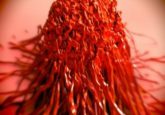Plain Language Summary of the ADAURA study: osimertinib after surgery for EGFR-mutated NSCLC

Abstract
Here, we summarize the initial results from the ADAURA clinical study looking at treatment with osimertinib in patients with a specific type of non-small cell lung cancer (also called NSCLC). Osimertinib (TAGRISSO®) is a medication used to treat a type of NSCLC with a change (mutation) in the EGFR gene, known as EGFR-mutated NSCLC. EGFR stands for ‘epidermal growth factor receptor’. It is a protein present on the surface of both healthy and cancer cells that can regulate how cells grow and divide. Sometimes, certain mutations in EGFR can result in the EGFR protein malfunctioning, which can lead to the formation of cancer, like EGFR-mutated NSCLC. Based on previous clinical studies, osimertinib is already approved for use in patients with EGFR-mutated NSCLC that has spread beyond the lung (metastatic disease). This medication works to stop, prevent, or slow the growth of EGFR-mutated NSCLC tumors, by specifically blocking the activity of EGFR.
In the ADAURA clinical study, participants had resectable EGFR-mutated NSCLC, which means they had tumors that can be removed by surgery. Participants took either osimertinib or a placebo (a dummy drug with no active ingredient) after having their tumors removed by surgery. Post-surgery chemotherapy was allowed, but not compulsory (this was decided by the participant and their doctor). To date, the study has shown that osimertinib could be beneficial for patients with resectable EGFR-mutated NSCLC. Participants who took osimertinib have stayed cancer-free for longer than those who took the placebo, regardless of whether or not they received chemotherapy after surgery. Osimertinib treatment also reduced the risk of tumors spreading to the brain and spinal cord, otherwise known as the central nervous system (also called CNS). The side effects experienced by the participants taking osimertinib have been consistent with what we already know.
Based on the results from ADAURA, osimertinib has been approved for the treatment of resectable EGFR-mutated NSCLC after tumor removal. The ADAURA study is still ongoing and more results are expected to be released in the future.





